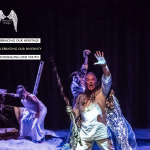SPECIAL REPORT – UK’s Premiere Musical Production of Little Women
Many achievements surround the staging of Little Women as a musical at the Lost Theatre from 12 December to 7 January. This report summarises the production’s critical reception and draws together what theatre reviewers suggest are the strengths and weakness of Little Women: The Musical.
The story of Louisa May Alcott’s Little Women, around a mother and her four daughters who fend for themselves while the man of the house goes off to the American Civil War, is built on an epic theme at least as old as Aeschylus’s Oresteia, a trilogy showing the effects of the Trojan War on the Greeks. The consequence of war on whole families and communities is something which immediately resonates with the families of those presently serving in Afghanistan. It also lives as part of the memory of millions of families throughout the world thanks to WW1, WW2 and any number of smaller skirmishes in Asia, Africa and the Middle East since 1945.
Ironically, there is overwhelming evidence that the absence of men through war also works in favour of women’s political and social emancipation. Jo March’s desire to live independently and achieve recognition as a novelist parallels other stories of imaginative and gifted 19th and 20th century writers such as Jane Austen, Emily and Charlotte Bronte, Miles Franklin, Virginia Woolf. Similarly, the ‘sisters’ of these writers sought the vote, a right to an education and equal pay when they refused to go back to the kitchen after working in factories and taking on other male responsibilities during war time.
Viewing Peter Layton’s and Lionel Segal’s adaptation of Alcott’s novel near the end of its run on Thursday night (5th January) still managed to evoke for me a sense of how these strong women fought against being confined to a domestic sphere. I found myself believing in Jo’s struggle as that of everyman or woman aspiring to live a productive life.
The production’s press release sets an optimistic tone by declaring that Alcott’s novel, and by implication the new musical’s adaptation of it, as a “celebration of women breaking the mould and achieving success both in work and life. Such optimism ocaught the attention reviewers: with some judging the work as a little too “saccharine sweetness” (What’sOnStage) while others viewed the positive nature of the story as a key feature of the strength and resilience of the ‘little women’. For instance, Amy Yorstan of the British Theatre Guide noted that “It would be easy to criticise the show for its sentimentality, but the overarching themes of hard work and love are wonderfully optimistic and this is a solid adaptation of a classic.”
In due course, Layton’s & Segal’s adaptation is analysed by critics in terms of how uneasily the original story lends itself to the musical genre (Nina Caplan TimeOut and Paul Vale The Stage) and what style of musical might have more effectively realized a fresh interpretation of story. Perhaps the most critical in this respect is Russell Lucas’s review in remotegoat when he declares:
I felt like I had seen it all before as nothing new was brought to the table. In short, I wasn’t engaged as a modern theatre goer. As it is no longer a road to success by putting ‘The Musical’ on the end of a famous story it is also no longer acceptable to have dream sequences to shoehorn in a ‘showstopper’ or sing ‘wiping the clouds away’ to cheer up a character. Let us also move on from light changes signalling a song and finally when a character dies let us not walk off into a smoke filled door representing ‘Heaven’ anymore. The techniques are old fashioned. The jig is up.
From my viewpoint, I believe the techniques used by Layton and Segal are perfectly appropriate in themselves. Dream sequences and death scenes work dramatically! The power of musicals is that they are the perfect form to enable the story to be felt as, for instance, Les Miserables allows audiences to feel Victor Hugo’s story. It would be fairer to say of the development of a musical version of a complex story like Little Women, so entrenched in an American historical context of one of the bitterest civil wars of all time, that it should have made more of the musical genre.
As all critics agree, there is much to praise about the production: they particularly single out Nicola Samer’s direction; Charlotte Newton John’s portrayal of Jo March; the clear characterisation of each of the four sisters; the clever songs; the comic antics of Aunt Marsh and other cameo roles. Furthermore, the design concept works very well, though the scene changes need some rethinking. Also, from where I sat, I know that the size of the bench on which Beth has her dying scene made her look stressed and uneasy for all the wrong reasons as she precariously attempted to stay on the furniture long enough to breathe her last breath.
A simple Google search reveals just how universally appealing the story of Little Women has remained with audiences since 1868, firstly as a novel (Project Gutenberg has it free to download), through at least three significant film adaptations in 1933, 1949 and 1994 and numerous play versions (including current productions in Ann Arbor Michigan and at the Gate Theatre Dublin). A ‘great’ musical of Alcott’s story, however, is yet to be achieved. The production I viewed at the Lost Theatre holds enough integrity for its producers, cast and creative team to hopefully aspire for that accolade with Little Women.
http://www.timeout.com/london/theatre/event/248466/little-women-the-musical
http://www.thepublicreviews.com/little-women-the-musical-lost-theatre-london/
http://www.britishtheatreguide.info/reviews/littlewomenlost-rev.htm
http://www.remotegoat.co.uk/review_view.php?uid=7908
http://www.thestage.co.uk/reviews/review.php/34725/little-women-the-musical
http://www.fringereview.co.uk/pageView.php?pagename=An%20Interview%20with%20Nicola%20Samer,%20director%20of%20Little%20Women
http://www.thepublicreviews.com/encore-nicola-samer/
http://en.wikipedia.org/wiki/Little_Women
http://www.gutenberg.org/files/514/514-h/514-h.htm
http://en.wikipedia.org/wiki/Little_Women_(1933_film)
http://en.wikipedia.org/wiki/Little_Women_(1949_film)
http://en.wikipedia.org/wiki/Little_Women_(1994_film)
http://www.londontheatre.co.uk/londontheatre/news/may05/18may05littlewomen.htm
http://www.indielondon.co.uk/theatre/t_little_women_musical_prev_CDrev.html
http://annarbor.com/entertainment/little-women-review/
http://entertainment.ie/Theatre/feature/Little-Women-%7C-The-Gate-Theatre/10/2033.htm
http://www.irishtheatremagazine.ie/Reviews/Current/Little-Women





